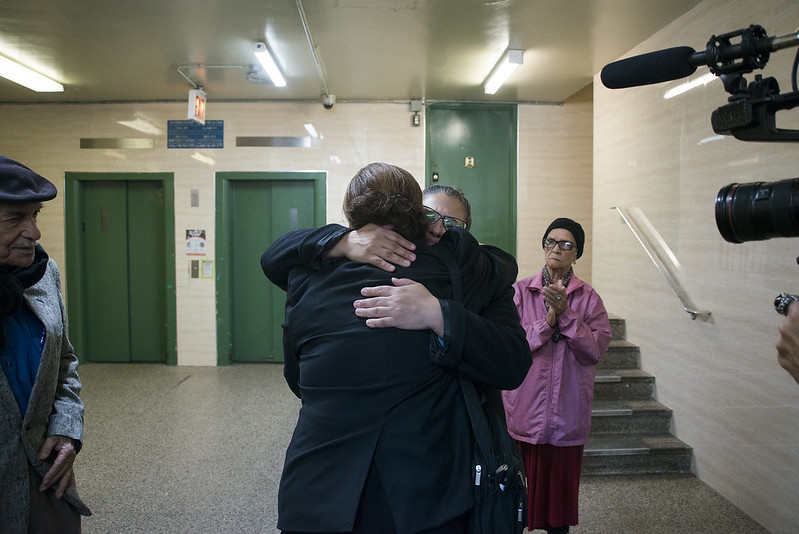
New York housing (photo: Jeff Reed/City Council)
New York City’s Right to Counsel (RTC) has proven to be successful at stopping evictions and protecting tenants’ rights. Evictions in New York City have plummeted, landlords are suing tenants less, and almost everyone who fights their eviction with an RTC attorney stays in their homes. This has been especially true during the pandemic. Amidst ever-changing laws and complicated government relief programs and administrative orders, RTC has been critical.
And it’s now even more critical with the expiration of the state’s eviction protections.
When the RTC law first passed, almost no tenants had attorneys when facing eviction in court. This meant that in order to get to a place where all income-eligible tenants had RTC (about 65-80% of tenants in court at the time), legal services organizations needed time to hire, train, and support the new attorneys, paralegals, and support staff.
In the last four years, New York City went from less than 100 tenant attorneys to over 600. In addition, the city’s Office of Civil Justice (OCJ) needed time to set up the infrastructure, coordinate with the state-run courts to implement this first-in-the-nation, new legal right. For all of these reasons and more, RTC had a five-year phase-in plan, giving the city until July 2022 to fully implement RTC for all eligible New York City tenants. However, once the COVID-19 pandemic hit, this timeline could no longer be justified.
The pandemic has devastated our city in so many ways. More than 400,000 New York City households are unable to pay rent, owing over $1 billion in rent. While the state’s rent relief program has helped, it is not enough. And it won’t keep tenants out of court. The rent relief program and myriad of other laws passed by the State Legislature created a confusing set of rights that landlords will surely take advantage of, as they have across the country. Tenants deserve to have their rights defended, making Right to Counsel so incredibly critical at this moment.
Soon after the COVID-19 pandemic hit, the city recognized that it could no longer move some cases forward with an attorney and others without – everyone deserves representation in court regardless of income. While this shift in implementation happened in part because so few cases were moving forward thanks to the various eviction moratoria, it was the right response morally. Our bill, recently made into law, made this model permanent, speeding up the full implementation of RTC by more than a year.
While the income restrictions haven’t been lifted under the law (this is something our statewide RTC bill would do), New York City has granted a blanket income waiver to all cases allowing legal services providers to represent tenants regardless of income.
This is an amazing victory for tenants. But, how will it work?
If there wasn’t enough legal capacity for all income eligible tenants before the pandemic, how will there be enough now given the unprecedented number of families we expect landlords will sue as soon as the eviction protections lift? How can we ensure legal services providers won’t enforce the income restrictions themselves, as a way to protect their capacity? How can we ensure that legal services aren’t overwhelmed with cases and that tenants get the thorough and zealous defense they deserve? After all, as our eviction crisis monitor shows, the neighborhoods hit hardest by COVID-19 are also being targeted for evictions. It would be unconscionable if these mostly Black and brown tenants could not get the representation they deserve.
The answer is simple: Move only the cases where tenants are represented forward and adjourn all the rest until the legal services organizations have capacity to take more cases.
These adjournments happen in other courts, like family court, where there is a Right to Counsel. There is a legal basis for judges to grant repeat adjournments for the assignment of counsel and due process requires it, plus judges have a broad discretion to adjourn cases as they see fit. Thanks to New York State’s Housing Stability Tenant Protection Act, housing court judges have much greater ability to adjourn cases.
The legal arguments for multiple and prolonged adjournments for the purposes of Right to Counsel assignment, both in terms of New York City’s Right to Counsel law and also as a matter of due process, are clear.
Cases have already slowed down during the pandemic, and there was no great collapse. There is no reason to return to the fast-paced, high-volume courts of the past. They were unjust then, and they would be a death sentence now, especially as COVID-19 cases recently surged across New York City due to the Omicron variant. As we have done over the past two years, slowing down the court system is the only moral response.
***
Corinthia A. Carter is the president of Legal Services Staff Association (LSSA 2320), which represents the more than 600 secretaries, paralegals, receptionists, process servers, social workers, attorneys, and other non-management staff of Legal Services NYC and Mobilization for Justice. Beverly Rivers is a tenant leader with the Flatbush Tenant Coalition, a member-led group of tenant associations in Flatbush, East Flatbush, and South Crown Heights working collectively to build tenant power.
***
Have an op-ed idea or submission for Gotham Gazette? Email This email address is being protected from spambots. You need JavaScript enabled to view it.